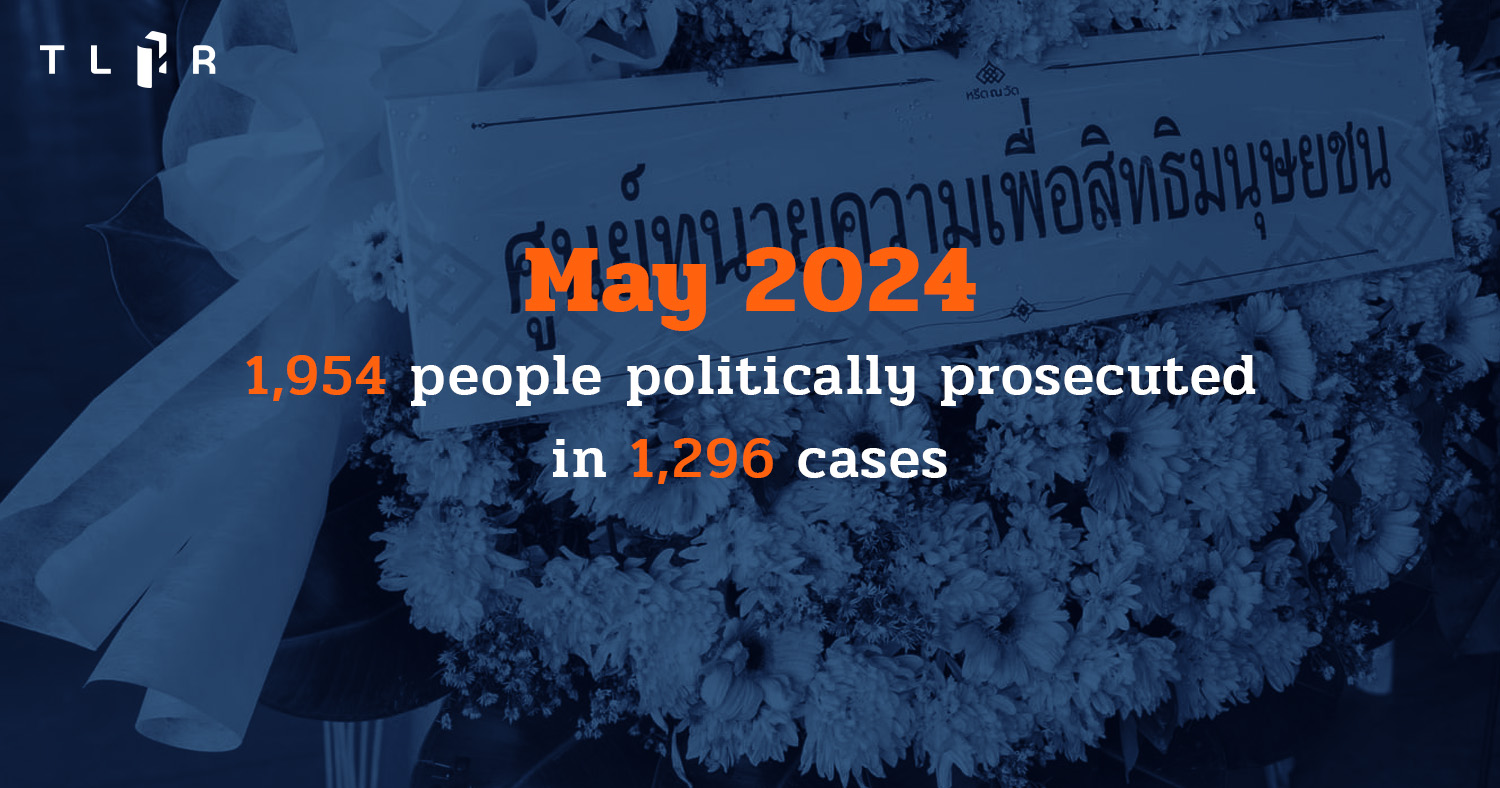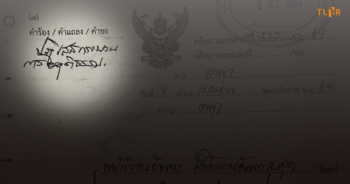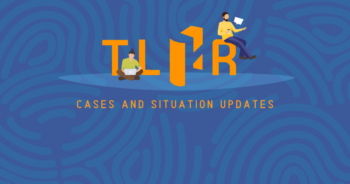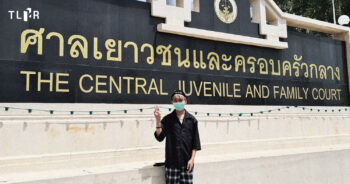| May 2024 | ||
| Total number of politically charged personsAltogether 1,954 persons in 1,296 cases | ||
| No. of alleged offenders | No. of cases | |
| Section 112 | 272 | 303 |
| Section 116 | 152 | 50 |
| Violating Emergency Decree | 1,466 | 670 |
| Public Assembly Act | 181 | 99 |
| Computer Crimes Act | 202 | 225 |
| Contempt of Court | 43 | 25 |
| (At least 34 persons indicted in 10 contempt of court cases) | ||
| *Statistics covering 18 July 2020 until 31 May 2024) | ||
Last May did not see a significant increase in legal cases related to political expression. The court proceedings on existing cases, however, remained intensely persistent. Rulings have been made in over ten Section 112 cases and another four Emergency Decree cases. Key cases included the case against “Tanaporn”, a mother with a toddler from Uthai Thani whose conviction and two-year-sentencing were upheld by the Supreme Court without suspension, adding her to a list of new inmates in Section 112 cases. Another major development was the death of “Bung Netiporn”. Meanwhile, the Computer Crimes Act case against “Danai”, an artist from Phuket was dismissed by the Supreme Court after more than four years of court battle.
According to Thai Lawyers for Human Rights (TLHR), since the Free Youth led public assemblies on 18 July 2020 until 31 May 2024, at least 1,954 individuals have been charged for participating in public assemblies or expressing their political opinions in 1,296 cases. Compared with April, there was only one new case in May.
Altogether, there have been at least 4.003 legal actions against the individuals although some of them are charged for multiple offenses.
Prosecution statistics in key offenses;
1. “Lèse-Majesté” pursuant to Section 112 of the Criminal Code, at least 272 individuals in 303 cases
2. Sedition pursuant to Section 116 of the Criminal Code, at least 152 individuals in 50 cases
3. Violation of the Emergency Decree, at least 1,466 individuals in 670 cases
4. Violation of the Public Assembly Act, at least 181 individuals in 99 cases
5. Violation of the Computer Crimes Act, at least 202 individuals in 225 cases
6. Contempt of court, at least 43 individuals in 25 cases, and insult of the court, at least 34 individuals in 10 cases
Of 1,296 cases, 567 have reached final verdicts. There are at least 729 ongoing cases that are being pursued at different stages of the justice system.
Prosecution trend in May 2024 and key events are as follows:
Regarding Section 112 cases, verdicts were delivered in more than 10 cases including the case against a mother with a toddler who was convicted and sentenced to prison by the Supreme Court, and the passing of Bung in prison.
There was no new case on Section 112 in May, albeit one suspect has answered to charges in one case, after receiving his summons the month before. It was the case against Piphat Wisetchumphon, 32, from Burirum, who has gone to the Khuan Khanun Police Station, Phatthalung, to answer to charges after the case had been reported against him by Songchai Nianhom from the People Protecting Monarchy Group. It allegedly stemmed from his Facebook posting regarding the executions of “Chit, Boot, Chaleaw” on 28 March 2023.
According to available information, Piphat is the 10th suspect who has been accused by the People Protecting Monarchy Group for committing violations of Section 112. Previously, reports on such offenses had been made to various police stations in the South, mostly against members of the public who did not even reside in the South, causing them to bear quite a burden and travel expenses to defend themselves.
As to the Section 112 cases that are being tried in court, last month, rulings were made in 10 cases, eight of which by trial courts, one by Appeals Court, and another by Supreme Court.
A notable case is the case against Chonthicha Jaengrew stemming from her alleged speech on the amendment of laws concerning the transfer of properties to the king, in front of the Thanyaburi Provincial Court on 11 September 2021. In her defense, she argued that her speech contained facts and it was made with good intent toward the monarchy. Also, she essentially intended to criticize General Prayut Chan-ocha’s government which amended and promulgated several laws concerning the king’s properties and powers.
The Thanyaburi Provincial Court, however, found the defendant guilty of violating Section 112 as the Court deemed that the defendant’s speech gave the impression that the king used taxpayers’ money for his own expense and interfered with the executive and judiciary powers, causing impairment to the reputation of the King and for him to be hated and scorned. The Court sentenced her to three years of imprisonment. Given her valuable testimony, the punishment was reduced to two years, while the Court granted her bail pending the appeals process.
People continue to face prosecution and punishment pursuant to Section 112 for exercising their freedom of opinion and criticizing facts pertaining to the monarchy and the royal succession, and defense in these cases continue to be a challenge.
Last month also saw two cases concerning arson where the accused were also charged under Section 112. Verdicts were also delivered in these cases. This included the case against Ammy-Poon for allegedly setting fire on His Majesty’s portrait in front of Klong Prem Central Prison. The Criminal Court found that despite the defendants’ claim that the arson had been committed to express their demand for the release of political prisoners, it indicated that if their demands were not met, the defendants could set fire on or destroy the monarch. It therefore constituted a threat and belittling of the king. In addition, since Ammy had also published the photos, it would have caused the king’s reputation to be tarnished as well. The Court convicted and sentenced Ammy to four years of imprisonment, and Poon to one year.
In the case against Micky Bang-Jittarin who was accused of setting fire on a triumphal arch honoring the King in Din Daeng during th #Mob19Sept21 demonstration, the Criminal Court found them guilty as charged. The Court saw that the two defendants were complicit in the arson, finding the claim of the prosecution witnesses that the act of arson was intended to express curses, threats and was considered improper to be believable. Also, since it caused the King’s reputation to be tarnished, it was an offense against Section 112. They were each convicted and sentenced to three years of imprisonment. Micky Bang was convicted of two additional years for allegedly setting fire to a traffic booth. In both cases, the defendants were granted bail pending their appeals by the Criminal Court.
In light of these situations, there appears to be a wide range of interpretations by the courts in Section 112 cases, regarding acts of expression toward the King’s portrait or symbols. Previously, there were cases of the portrait’s arson which were not prosecuted on the offense. Or in other cases concerning the relocation of the portrait and the throwing of paint at the portrait without writing any statement written on the portrait, where the Courts have only found the defendants guilty of causing damage to the property since they did not show clear intent of defamation, insult, or threat.
A case that has been issued a verdict by the Appeals Court includes the case against “Boss Chatmongkhol” who allegedly posted a comment in the “Sri Suriyothai” Facebook Page. The case was previously dismissed by the Chiang Rai Provincial Court, given the insufficient prosecution evidence to prove the defendant was the person who made the comment. As the case was appealed by the prosecutor, the Appeals Court Region 5 overturned the previous verdict and found the defendant guilty as charged. The Court accepted the prosecution’s evidence which accused the defendant as the person who posted the comment, convicted him, and sentenced him to 27 months of imprisonment. He has been granted bail by the Supreme Court pending the appeals and had to stay in prison for one night.
For cases reaching the Supreme Court which included the case against Tanaporn, 24, a mother of a toddler from Uthai Thani who was indicted for allegedly posting her comment on a Facebook post which featured doctored images of Their Majesties Kings Rama VIII and IX in 2021.
In this case, she pleaded guilty without the presence of a lawyer. Later, the Talingchan Criminal Court convicted and sentenced her to four years of imprisonment which was reduced to two years, given her guilty plea, with suspension. The Chief Justice of the Court, however, intervened and proposed that her sentencing not be suspended. And as the case was appealed, the Appeals Court revised the previous verdict and found the defendant’s act offensive and caused the monarchy’s reputation to be tarnished. Consequently, the Court did not suspend her punishment. She was granted bail pending the verdict of the Supreme Court.
Finally, on 27 May 2024, the Supreme Court affirmed the Appeals Court’s verdict, which resulted in the imprisonment of Tanaporn at the Thonburi Women’s Correctional Institution. According to available information, this was the second Section 112 case since 2020 that received a verdict from the Supreme Court. In both cases, the defendants pleaded guilty as charged, but the Supreme Court similarly ruled against granting them parole.
Last month also saw a key incident take place regarding the case of “‘Bung’ Netiporn”, a 28-year-old activist from Thalu Wang, who had been detained in a Section 112 case. The case stemmed from her conducting a public opinion poll on whether the royal motorcade caused inconvenience to the public. She also went on a hunger strike to demand the reform of the justice system and the release of all political prisoners since the beginning of her detention in late January 2024. She passed away while receiving treatment at the Department of Corrections Hospital on 14 May 2024. Although the Department of Corrections Hospital sent her to receive treatment at the Thammasat University Hospital, they failed to save her life. Bung’s death still requires proper investigation into the causes as well as the duties of personnel at the Department of Corrections Hospital.
Following Bung’s death, the Court granted bail to “Tawan” and “Frank” who were charged under Section 116 for allegedly honking at the passing royal motorcade, after they had been detained pending investigation and inquiry for nearly four months, citing change of circumstances around the case, the conclusion of the investigation, the impossibility for the defendants to tamper with evidence, and the lack of objection from the prosecution. In addition, the Court cited that the defendants had been detained during the investigation for quite some time. It is interesting to note that previously, the attorneys had applied for bail of both persons several times to no avail, with the Court repeatedly stating that there was no reason to change the previous order.
For other detainees in ongoing cases, despite an attempt to apply for their bails yet again in the past month, the Appeals Court and the Supreme Court continued to deny them bail. Therefore, as of the end of May, at least 26 detainees are still imprisoned on Section 112 charges, including eight individuals whose cases have reached the final verdicts, and 17 individuals whose cases are being deliberated, as well as one juvenile offender detained in an order by the Juvenile Court. In addition, there remain at least 16 political prisoners convicted on other charges.
No new protest case, but arrests carried out for those previously charged, four new rulings on Emergency Decree cases
In May, there were no new cases related to public assembly except for one case being tried in court, where the defendants pleaded differently. Consequently, the prosecution had to handle the case separately: one defendant pleaded guilty, while the other pleaded not guilty. The court ruled on the case based on the guilty plea. As a result, the total number of cases needs to be recalculated.
In the past month, “Thanom” a 55-year-old homeless person was arrested in a case related to the #Mob20March2021 public assembly at the Kok Wua Intersection. In the middle of 2023, the prosecutor decided to prosecute the case, but Thanom failed to turn himself in and could not be contacted. An arrest warrant was issued against him. Then in early May 2024, he was placed under arrest and detained at the Bangkok Remand Prison, without anyone being informed about it. It wasn’t until late last month that other political prisoners encountered him, leading to his situation being reported to the attorneys. Efforts were subsequently made to secure his release on bail. In total, Thanom was detained for 25 days.
Moreover, in the case of “Tawan”, after she was granted bail in a Section 116 case, police from the Royal Palace Police Station attempted to arrest her under an arrest warrant related to accusations of supporting “Bung-oen,” who was charged with spray painting the Grand Palace’s wall. The warrant had been issued by the Criminal Court since 22 May 2023, yet until that point, the police had neither executed it nor summoned her to answer to the charges, despite the facts that she had been arrested in other cases and was detained. The police, however, allowed her to post bail immediately following the arrest. Nevertheless, the police allowed her to post bail immediately after the arrest. Tawan is the fourth suspect in this case, following a Prachatai reporter, a freelance photographer, and Sainam.
Arrest warrants continue to be wielded as tools with their timing strategically selected for political purposes and create a chilling effect to the activists. This practice by the police persists unchecked.
In the past month, the Courts of First Instance ruled in three more cases related to violations of the Emergency Decree. In the case related to a public assembly to demand the release of political prisoners in front of the Thanyaburi Provincial Court on 11 September 2021, the Thanyaburi Provincial Court ruled to acquit the ten defendants citing a lack of prosecution evidence to hold them responsible as the organizers, and the space in front of the Court was open with flowing air and was not crowded. The defendants also wore face masks, and kept distance among each other. There had also been no reported cases of Covid-19 outbreak following the public assembly.
On the contrary, the Courts found the defendants in the other two cases guilty, including the case against three former students of Chiang Mai University, who marched from the Three Kings Monument to the Muang Police Station in Chiang Mai on 17 November 2020. In this case, the Chiang Mai Kwaeng Court fined them each 4,000 baht citing the crowdedness of the public assembly, the fact that some participants failed to wear face masks, and a lack of temperature checking stations. The verdict came despite evidence from both the prosecution and the defendants that both prior to and after the public assembly, there were no cases of infection. And in the case against three members of the Thalu Fah Group, who were accused of participating in the #Mob19Sept2021 public assembly in Din Daeng, the Court found that by merely participating in the public assembly, the defendants had committed a violation. They were each sentenced to ten days in prison (as a result of other charges as well).
In addition, in the Satun Car Mob case, the Appeals Court Region 9 upheld a previous ruling that found the three defendants guilty. The verdict came despite uncertainty about their roles as organizers, the fact that both the three defendants and other participants adopted measures to protect themselves against Covid-19 infection, and the fact that none of them contracted Covid-19 following the activity. The Court sentenced them to a one-year suspended prison term.
The Supreme Court dismissed the case of “Danai” under the Computer Crimes Act for allegedly posting that there were no Covid-19 screening at Suvarnabhumi Airport, after more than four years of litigation.
At the end of May, the Supreme Court delivered a significant ruling in the case involving “Danai Ussama,” also known as Mr. Zen, a graffiti artist from Phuket. He was accused of violating Section 14 (2) of the Computer Crime Act B.E. 2560 for a Facebook post on March 16, 2020. In the post, he stated that upon returning from Barcelona, Spain, he found no officials conducting passenger screening at Suvarnabhumi Airport during the initial Covid-19 outbreak. This prompted the Director of Legal Affairs of Airports of Thailand PLC to file a case against Danai.
After more than four years in court, the case has reached the Supreme Court. Although the Lower Court acquitted him, the Appeals Court found him guilty and sentenced him to one year suspended prison sentence and a fine of 50,000 baht. The defendant insisted that he simply expressed his opinion according to what he saw, and had no intent to spread misinformation and cause any impact to national security.
The Supreme Court eventually acquitted him again, finding that the defendant had posted the message based on the impression he had during the time that there were no officials to conduct temperature checks of the inbound passengers. Given the benefit of the doubt, it could not be established that the defendant had any intention of committing the alleged offense.
This is another example of a case that should never have happened. When members of the public express their views in good faith based on their observations, it is the responsibility of public authorities to clarify and correct any misunderstandings without resorting to legal action. Danai has been burdened by the prosecution, having to defend himself without receiving any compensation for the ordeal he had to endure.




